In this article:
Pneumonia is a lower respiratory lung infection that is widely prevalent among people of all ages. This condition can afflict one or both lungs and causes the air sacs or alveoli in either or both the lungs to become inflamed and fill up with pus or fluid.
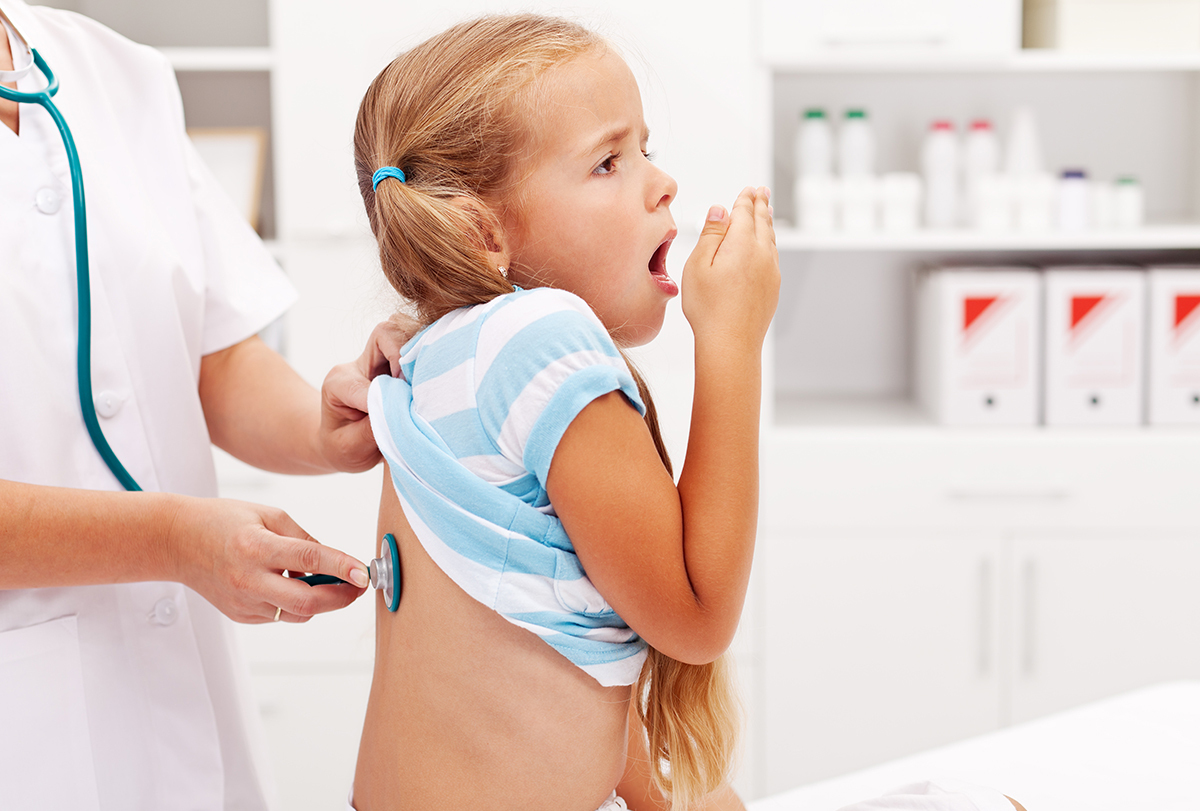
This build-up of fluid makes it increasingly difficult for oxygen to reach the blood and causes labored breathing along with other flu-like symptoms that persist for weeks and are often unresponsive to traditional cold and sinus medicines.
Note: Consult your doctor for proper diagnosis and treatment of this condition. Use home remedies only as an adjunct to treatment.
Children are one key demographic that are at an increased risk of this disease. Contrary to adults, however, newborns and infants may not exhibit the characteristic symptoms of pneumonia such as a nagging cough or fever, and the manifesting symptoms might be too vague or subtle to be readily detected.
Children have an underdeveloped immune system and their infection-fighting responses are rather nascent which makes them an easy prey for pneumonia-causing pathogens.
Needless to say, malnourished children or those with compromised immune responses are at a far greater risk of catching pneumonia, for whom this condition can even turn fatal. This should be reason enough for you to take pneumonia seriously and seek prompt medical help if you notice any of its symptoms.
While the period between birth and 2 years of age is when the threat looms largest, children above 2 years are not immune to this disease either.
Dealing With Pneumonia in Children
Here are some home remedies to ease the symptoms of pneumonia and promote healthy recovery in children. You can use these remedies to complement the doctor’s treatment plan.
1. Slightly warm moist air can help
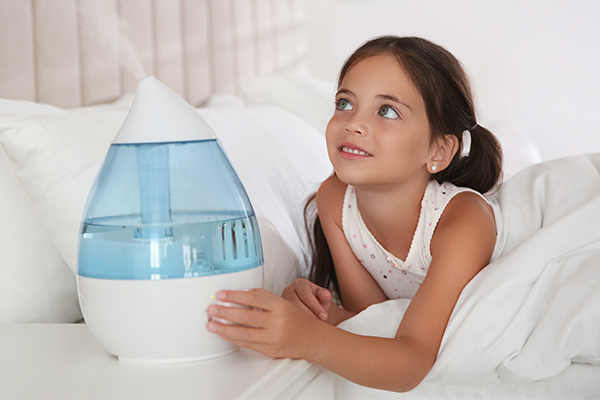
Warm moist air will help loosen and break down the sticky mucus that could be blocking your child’s airway and making it difficult to breathe. You can use a humidifier or a mist vaporizer in the room where your child rests. (1)
How to use:
- Fill the humidifier with warm water.
- Allow your child to breathe in the warm mist.
Caution: Do not use steam vaporizers because they can end up burning your child if he/she happens to fiddle with it. (2) Also, be sure to clean the humidifier regularly to prevent mold buildup.
2. Breast milk can help reduce the risk of pneumonia in infants
For babies younger than 6 months who are diagnosed with pneumonia, breast milk is very important. It offers a unique balance of nutrients that strengthen the baby’s weak immune system and is tailored to fight the baby’s illness.
Breast milk is quickly and easily digested. It will even keep a sick baby properly hydrated, which is essential for fast recovery.
A 2011 study published in the Journal de Pediatria reports that increased prevalence rates of breastfeeding during the first year of life and exclusive breastfeeding during the first 6 months of life is associated with a reduction in the number of hospitalizations for pneumonia. (3)
Another 2013 study published in BMC Public Health highlights the importance of breastfeeding during the first 23 months of life as a key intervention for reducing illness and death due to pneumonia. (4)
- Try to breastfeed your young baby frequently. If your baby refuses to nurse while experiencing a fever, try different nursing positions.
- If your baby refuses to nurse regularly, then pump out the breast milk and feed it to your baby using a spoon or bottle.
3. Ensure your child gets proper rest
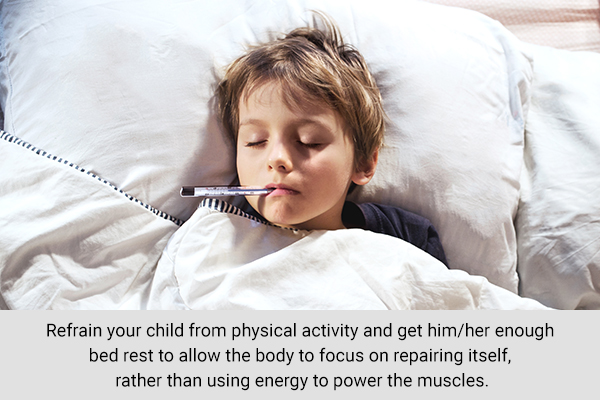
A sick body needs plenty of downtime to heal. For small children suffering from pneumonia, it is important for parents to make them rest as much as possible.
Refrain your child from physical activity and get him/her enough bed rest to allow the body to focus on repairing itself, rather than using energy to power the muscles. Rest is vital for cellular repair in the body and is especially beneficial for shortness of breath. Conversely, physical exertion can end up exaggerating the symptoms.
Do not send your child to play school or take him/her to the playground until after his/her temperature returns to normal and he/she stops coughing up mucus.
Even when your child starts to feel better, be careful that he/she does not overdo it. Because pneumonia can recur, it’s better not to make your child jump back into his/her routine until fully recovered. Thus, adequate rest is also vital for preventing a relapse.
4. Hydration is important
To properly manage pneumonia in infants and children, proper hydration is a must.
Pneumonia can cause mild fever in children. During fever, keeping the body sufficiently rehydrated with the help of liquids and electrolytes is essential to prevent dehydration.
Also, fluid intake helps to thin excess mucus and to ease coughing. Expelling mucus helps the body to get rid of the germs out of your child’s system, allowing quick recovery from the lung infection.
- Feed breast milk as well as fruit juice and chilled yogurt to babies 6 months or older. For younger babies, feed plenty of breast milk or baby formula.
- If your child is older, make him/her drink lukewarm water or milk at regular intervals.
- Fruit juice, vegetable soup, and clear broths are also good options.
If your child refuses large amounts of fluids at a time, give smaller amounts more often.
5. Use a lukewarm water compress
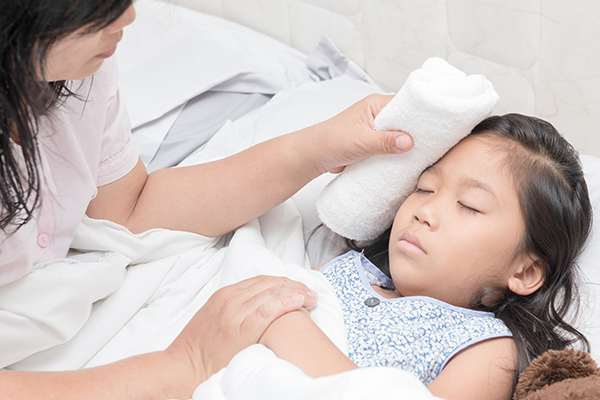
Apart from coughing, your child may develop mild chest pain due to pneumonia. To help your child get relief, use a lukewarm compress.
How to use:
- Put some lukewarm water in a bowl.
- Soak a clean washcloth in the water.
- Wring out the excess water, and then place the wet cloth on child’s chest.
- Once the cloth warms, remove it and repeat again.
You can also use a damp washcloth to sponge areas like your child’s armpits, feet, hands, and groin to reduce the body temperature during fever. A lukewarm water bath also goes a long way in reducing the fever.
Prevalence of Pneumonia in Children
To give you a real sense of the magnitude of this health scare, we’ll let the numbers do the talking.
As of 2016, pneumonia emerged as the leading cause of death due to infectious disease among children under five, accounting for the death of around 880,000 children globally. Most of these children were less than 2 years of age. (5)
Causes of Pneumonia in Children
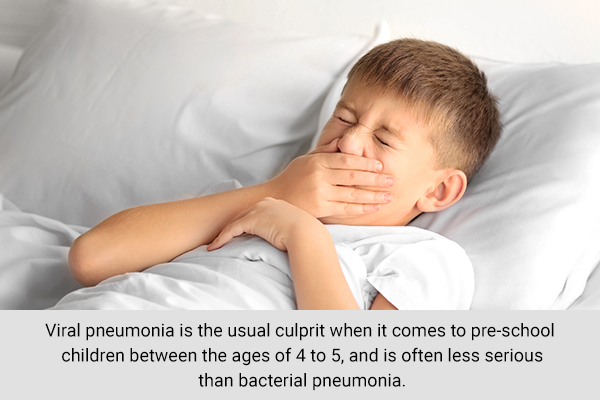
Pneumonia can be caused by a number of viruses and bacteria: (6)
Bacterial causes of pneumonia include:
- Streptococcus pneumoniae
- Hemophilus influenzae
- Staphylococcus aureus
- Mycoplasma pneumonia – which causes a mild form of pneumonia known as walking pneumonia in school-going children
Viral pneumonia is the usual culprit when it comes to pre-school children between the ages of 4 to 5, and is often less serious than bacterial pneumonia. The major viral causes of pneumonia in infants and children are:
- Respiratory syncytial virus
- Influenza virus
- Adenoviruses
- Parainfluenza virus type 3
- Human metapneumovirus (7)
Moreover, if your child has an already weakened immune system, he/she runs the risk of developing aspiration pneumonia which is caused by inhaling large amounts of harmful fumes emanating from air pollution, cigarette smoke, chemicals or vomit.
Similarly, breathing in the fungi present in soil and bird droppings is another less prevalent cause of pneumonia in children, especially those with suppressed immunity.
Symptoms of Pneumonia in Children
The symptoms of pneumonia in children vary depending on the child’s age and causes of pneumonia. Children often exhibit one or more of the following symptoms: (8)
- High fever
- Fast and/or difficulty breathing
- A cough
- Irritability or fatigue
- Pain in the chest (especially when coughing)
- Abdominal (tummy) aches or pain
- Loss of appetite
- Weakness
Prevention of Pneumonia
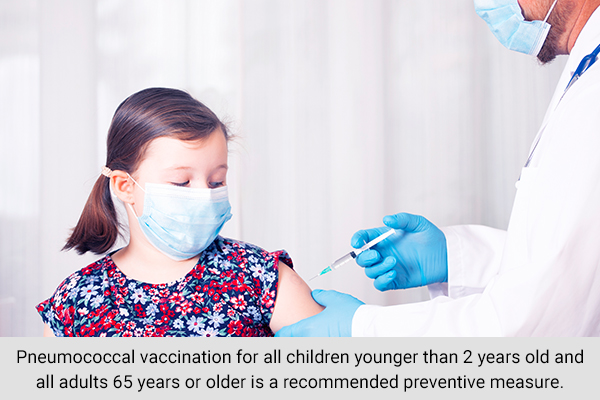
Vaccination is the main preventive measure against pneumonia. There are vaccines available that prevent some types of pneumonia and flu.
In fact, the Centers for Disease Control and Prevention recommend pneumococcal vaccination for all children younger than 2 years old and all adults 65 years or older as a preventive measure. (9)
The CDC also recommends an influenza shot for all children over the age of 6 months. (10)
In a 2017 study published in the Bulletin World Health Organization, researchers analyzed the benefits of pneumococcal conjugate vaccines and hospitalization of children for pneumonia in South Africa from the period 2006–2014. It was found that post the introduction of pneumococcal conjugate vaccines into the country’s national immunization program; there was a record decrease in pneumonia hospitalizations among children under 5 years old. (11)
So, to protect your child from pneumonia, make sure your child gets vaccinated at the right time. Consult your doctor to stay abreast of any advancements in vaccine options, and to stay on top of the vaccine schedule stipulated for your child.
Other preventive steps to lower the odds of your child coming down with pneumonia include the following:
- Ensure that your child stays away from anyone who is sick. Also, if your child is suffering from fever, runny nose, coughing, sneezing, etc., then it would be advisable to keep him/her away from healthy children.
- Make sure that your child is given the flu shot yearly.
- Regular hand washing is crucial in preventing viruses or bacteria from entering the body. For added convenience, always carry a hand sanitizer to rid your child’s hand of festering germs in situations where hand washing is rendered impossible.
- Do not allow your child to share personal items, such as eating utensils, cups, tissues, and handkerchiefs with anyone.
- Keep your child’s immune system strong by following a healthy diet. Include fresh vegetables and fruits, especially the ones containing a high quantity of vitamins C and A to strengthen their immune system.
- Make exercise a part of your child’s daily routine to build immunity.
Additional Tips to Prevent Pneumonia
- Avoid smoking in front of your child as second-hand smoke will aggravate the symptoms.
- It is crucial to complete the child’s full antibiotic course if he/she has been prescribed.
- Always use a measuring device to give medication.
- Don’t treat a fever in children less than 18 years of age with aspirin, as it can lead to serious health problems.
When to See a Doctor
Consult a doctor immediately if you think your child has pneumonia. Immediate medical attention is all the more imperative if you notice any of the following symptoms in your child:
- Fast, noisy, or heavy breathing
- Loss of appetite
- Looks pale and unwell
- Is taking forever to recover from a mild illness
- Suddenly seems to get worse after signs of recuperative improvement
Expert Answers (Q&A)
Answered by Dr. David Stukus, MD (Pediatric Allergist/Immunologist)
Children have much smaller airways and decreased ability to effectively cough mucous out of their lower airways compared with adults. Young children may also not have received their full vaccine series yet, which can make them vulnerable to some types of bacterial infections.
Increased exposure to viruses and bacteria at daycare and school can also contribute to the risk of contracting the infection.
The most common symptoms when anyone has pneumonia are cough and fever. Infants with pneumonia often breathe faster than normal, have much more difficulty breastfeeding or taking a bottle, don’t sleep as well as normal, and may become more lethargic.
Tylenol and Motrin are tried, and true fever-reducing medications and are our first-line treatment for fever in children. Aspirin should never be used in children less than 18 years old without discussing it with their doctor first.
Reye’s syndrome is a rare but serious condition that can occur when aspirin is used in children less than 3 years old or any child who may have chicken pox or flu-like symptoms.
Children with pneumonia can have a lingering cough for weeks after they initially become sick. There are many factors that determine how sick a child with pneumonia can become and how long it takes before they improve.
Viral pneumonia does not require antibiotics and subsides on its own; supportive care is given to make people feel better. Bacterial pneumonia should be treated with antibiotics.
Pneumonia cannot be diagnosed without a thorough physical exam by a qualified health care professional and a chest X-ray. Pneumonia cannot be diagnosed over the phone, by a parent or caregiver, or just based on a cough and fever. So, anyone who suspects pneumonia needs to be seen by their doctor.
If someone already has pneumonia, then they should be seen again if they are having difficulty breathing, shortness of breath, or severe chest pain.
Final Word
In developed countries like the United States, pneumonia is not as life-threatening as it once was because of the availability of antibiotics and other modern treatments. However, in developing countries, pneumonia is still a big threat to children.
The severity and diagnosis of this condition usually depend upon the causative pathogen, and its symptoms can range from mild to life-threatening.
Given your child’s immature immune system, it would be ill-advised to take your kid’s health in your hands and tackle a potentially life-endangering problem such as pneumonia without proper medical supervision.
Prompt referral to a seasoned pediatrician is the first step towards recovery. Once the doctor lays down a treatment plan custom-made according to your child’s symptoms and severity, it is essential to stick to it.
You can simultaneously adopt certain adjunctive remedies to give your child’s immune system a much-needed push and help relieve the distressing symptoms.
- Was this article helpful?
- YES, THANKS!NOT REALLY



